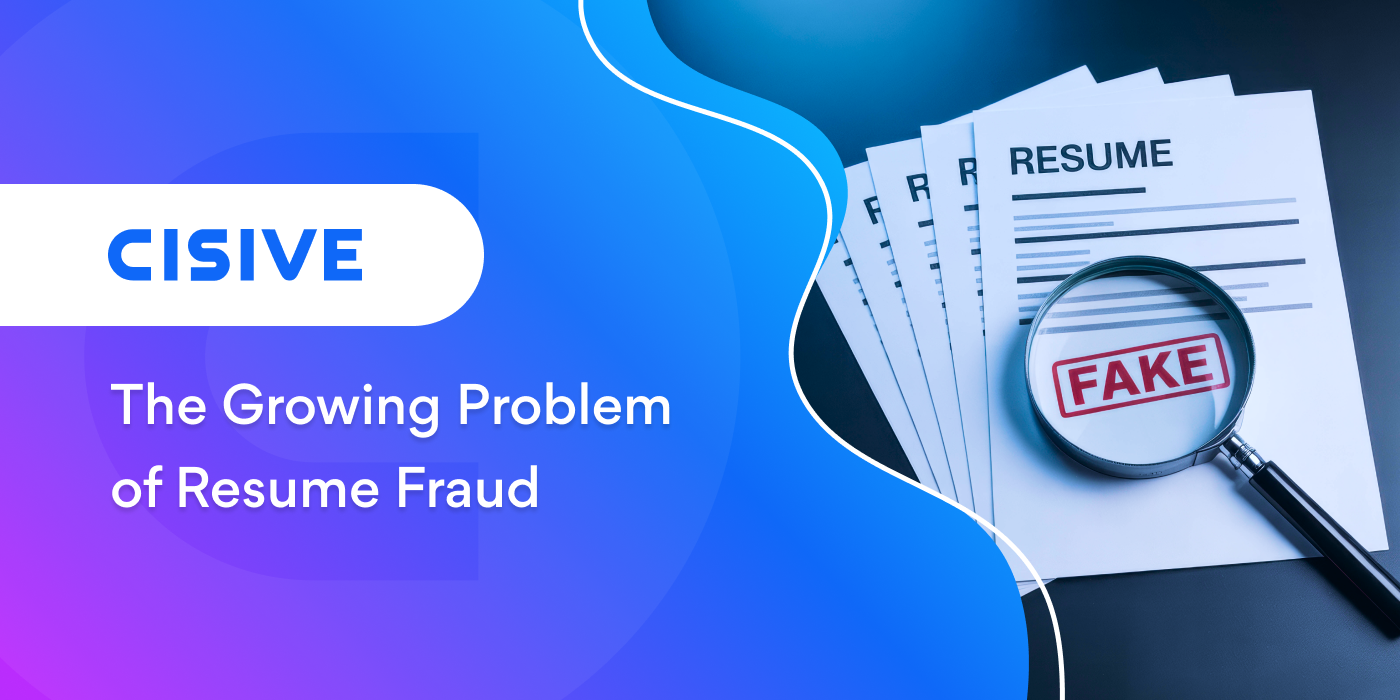

Ensuring workplace safety is the primary reason 96% of employers conduct background checks,...

Resume fraud is a global problem that affects employers, the gig economy, and volunteer agencies. Whether you’re screening applicants in the United States or abroad, it’s important to verify information about each candidate’s education, work experience, and criminal background.
Thorough resume checks can help you avoid the consequences of resume fraud and strengthen your organization’s hiring program.
Key Takeaways
|
Resume fraud is the practice of adding false or misleading information to a resume or curriculum vitae. Applicants commit this type of fraud to improve their chances of landing interviews and job offers.
For example, an applicant with three years of experience might state that they have five years of experience to qualify for midlevel positions with higher salaries. Another example of resume fraud is when an applicant alters their dates of employment to eliminate job gaps or make it look like they have a history of staying at the same job for many years.
Applicants commit resume fraud for many reasons, including the desire to earn more money, a lack of work experience, and pressure to stand out from other applicants in an increasingly competitive job market. An applicant may also commit resume fraud to cover up long gaps between jobs.
Resume fraud is a serious problem, as it can cause you to skip over qualified applicants in favor of those who’ve falsified their professional documents. In the healthcare industry, resume fraud is a major safety concern, as it can allow an unlicensed or unqualified individual to have direct contact with vulnerable patients.
Cisive can help you mitigate these risks by performing comprehensive resume and employment verification before you hire someone. We go beyond standard background checks to ensure you have a complete picture of every applicant’s employment history and criminal background.
If you don’t catch resume fraud until weeks, months, or even years after you hire someone, it can lead to lost trust, negative press, and a lasting blemish on your company’s brand.
However, you can avoid these consequences by conducting thorough background checks with employment verification included. The potential liability from fraudulent resumes doesn’t just happen at the executive level; resume fraud occurs at all job levels and in all industries.
In 2019, Veronica Hilda Theriault was sentenced to two years in jail. Her crime?
Lying on her resume and submitting fake references for a job with the Australian government.
Resume fraud doesn’t always lead to criminal charges, but Theriault lied to the government and deceived the citizens of Australia.
During the investigation, law enforcement discovered that this wasn’t Theriault’s first time committing resume fraud. She submitted false information to at least two previous employers.
Ronald Zarrella, the CEO of Bausch & Lomb from 2001-2008, faked an MBA from New York University. Although he attended NYU, he didn’t complete an MBA there. Zarrella resigned when his deception came to light.
The dean of admissions at the Massachusetts Institute of Technology admitted in 2007 that she never earned the three degrees listed on her resume. In fact, she’d never graduated from college at all.
Scott Thompson, the CEO of Yahoo!, was forced to step down in 2012 after an activist investor claimed that he didn’t have a degree in computer science as he’d claimed on his resume. It turns out the investor was right.
Yahoo! terminated Thompson, resulting in the loss of his bonus and partially vested stock options, which cost him millions of dollars.
In 2020, a senior investigator for the Georgia State Department of Revenue resigned while under investigation for falsely stating in a job application that he had a degree from a nonexistent college. This last example is unique because of its implications for criminal justice.
“False statement… affects [an individual’s] credibility as a law enforcement officer,” Georgia Inspector General Deborah Wallace explains in an article from The Atlanta Journal-Constitution.
Cisive can help you avoid the financial and reputational risks associated with resume fraud. We don’t just perform a few reference checks; our team verifies each candidate’s credentials to ensure you can make hiring decisions with confidence.
Our comprehensive screening includes a criminal background check, reference checks, employment verification, and education verification. If you’re hiring someone to operate a commercial vehicle, we’ll also check their state motor vehicle record and driving history with the U.S. Department of Transportation (DOT).
While it's not unusual for applicants to present themselves favorably, problems can arise when it crosses the line into resume fraud with false certifications, degrees, past employment, and experience. As a result, employers may hire an individual who isn’t actually qualified to do the job and could end up costing the company in terms of lost productivity, mistakes, lost customers, administrative time, loss of investors and capital, and negative press.
HR professionals and background check firms have seen an alarming increase in resume fraud in the past decade, partly because the fraud is made easier by websites that create a false employment history for applicants or provide applicants with worthless degrees from diploma mills. This type of fraud goes beyond embellishing small details or exaggerating experience on a resume or application.
HR professionals and background check firms have seen an alarming increase in resume fraud in the past decade, partly because the fraud is enabled by websites designed to create false employment histories for applicants or provide applicants with worthless degrees from diploma mills. This type of fraud goes beyond embellishing small details or exaggerating experience on a resume or job application.
Additionally, only 57 percent of employers verify educational credentials as part of their hiring processes, with just 52 percent conducting formal education verifications. In contrast, 70 percent of job applicants have lied or would consider lying on their resumes, demonstrating the importance of comprehensive resume and employment verification.
Employers need to verify employment history, conduct reference checks, and perform education verification to ensure they hire the right candidates and protect customers—and themselves—from additional risk and liabilities.
HR departments have often been tasked with doing their own employment, education, and reference checks. With an increased workload, HR professionals may not have the time or the resources to track down contact information and repeatedly try to complete the necessary verifications.
For employers worried about liability issues associated with resume fraud, the bottom line is that it isn’t difficult to check each resume—it’s difficult to distinguish between fake and legitimate information. Technology makes it easy for someone to literally invent past job experience, credentials, and even college degrees.
Employment screening firms have current knowledge of what to look out for, how to spot fake websites and degree or certificate mills, as well as access to databases that can verify everything from dates of employment to salary information to job titles.
For credit reporting agencies (CRAs), this information is part of the screening process, and it’s their job to understand how people might be falsifying information. Another benefit of outsourcing is that you receive a single report with all verification information, making it easier to track verification-related data.
Finally, third-party companies use consistent screening processes, which helps ensure that every candidate receives the same level of scrutiny. This can help you show customers, regulatory agencies, and other stakeholders that you’re doing everything you can to minimize risk and hire only the most qualified employees.
Partnering with a company like Cisive can help you mitigate the risks associated with resume fraud, as screening companies specialize in employment and education verification, along with comprehensive background checks.
Our team of experts verifies education records, employment history, professional licensing and certification, Department of Transportation and state driving history, and military service. They also perform reference checks, saving you time and reducing the risk of liability for your organization.
Speak with an expert today to find out how we can help you increase efficiency without scaling back on your verification efforts.

Ensuring workplace safety is the primary reason 96% of employers conduct background checks,...

Historically, expungement means that by law, an employer is not allowed to ask about any charges,...

An employer’s ability to quickly onboard new employees can be beneficial for meeting customer...